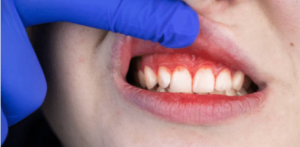Gingivitis is a type of gum disease. Often, it develops when plaque builds up on the teeth and causes inflammation in the gum tissue. This occurs because the plaque produces various toxins that irritate the tissue.
In some patients, this leads only to inflammation. However, others experience bleeding gums. Moreover, the bacteria from plaque have the potential to lead to issues beyond periodontal disease. For instance, it might cause a weakening of the tooth enamel.
Even with frequent brushing, it’s essential to care for your gums. A healthy mouth starts with healthy gums and teeth.
Unfortunately, gingivitis typically occurs in 3 out of 4 Americans at some point in life. However, it’s possible to reverse it with proper care early on. Without treatment, it develops into periodontitis, which is a more severe form of gum disease.
At this stage, it has the potential to cause tooth loss in adults. Let’s take some time to learn more about gum disease, symptoms, and prevention. If you have any questions, remember that your dentist is a great source of information.
Book an appointment with a dentist in your area for a thorough oral health exam.
Causes of Gingivitis
As mentioned above, the main cause of gingivitis is the buildup of plaque. Plaque is a sticky film that occurs naturally on the teeth and gums. Unfortunately, it contains bacteria.
Still, other factors have the potential to increase your risk of gingivitis. If any of the below factors apply to you, it’s important to pay close attention to your teeth and gums. Moreover, speak with your dentist about how to improve your dental and oral health.
Smoking & Tobacco Use
One of the biggest risk factors for gum disease is smoking and the use of tobacco. Moreover, it lowers the chance for successful treatment. According to some research, smokers are several times more likely to suffer from gum disease.
Improper Oral Hygiene
Poor oral hygiene is an easily avoidable cause of gum disease. Common examples are a lack of flossing and improper brushing.
Not Removing Plaque Fully
In some instances, people miss plaque around the gum line even when they remove the plaque on the teeth. That’s why it’s important to floss regularly and use a brush the reaches around the gum line.
Stress
Among the many causes of gingivitis, people rarely think about stress. Constant stress has the potential to weaken your immune system. This negatively impacts your body’s ability to fight infection, which includes gum disease.
Poor Nutrition
Poor nutrition deprives your body of the essential nutrients it needs. In turn, it becomes more difficult for your body to fight off infections.
Chronic Diseases
Chronic diseases impair your body’s ability to fight off infection. This leaves your body more vulnerable to an array of infections and bacteria, including gingivitis. These range from diabetes to HIV and cancer.
If you have any medical condition, it’s important to let your dentist know.
Medications
Unfortunately, medications for certain conditions have an impact on oral health. When you have an appointment with your dentist, let them know about any prescriptions or over-the-counter medications you take.
Because it is crucial to eliminate plaque in order to prevent gingivitis, remember to use an anti-gingivitis toothpaste. Moreover, certain mouthwashes help to fight plaque, bacteria, and infections.
Focus on improving your oral hygiene routine: brush for at least 2 minutes twice each day and floss at least once each day.
Signs & Symptoms of Gingivitis
Generally speaking, gingivitis does not cause much pain. Therefore, people don’t realize they have it until their dentist tells them. In fact, roughly 75% of Americans experience gum disease at some point in their lives.
As such, it is crucial to know what to look for. Moreover, it’s important to visit your dentist for regular cleanings and dental exams.
Here are a few symptoms that point to gum disease.
- Puffy, inflamed gums with a red hue
- Bleeding gums, particularly as you floss or brush
- Tooth pain and sensitivity, resulting from the gums pulling away and exposing the teeth.
- Soreness in the gums that doesn’t go away
- Bad breath – the bacteria in plaque produces foul-smelling waste
- Loose teeth or changes in your bite alignment
Treatment & Prevention
If you have gum disease or think you might, it’s common to feel anxious. Oftentimes, people don’t know what to do. However, your dentist has the experience and expertise to help you manage or prevent gum disease.
Whether you want to prevent or treat gum disease, the strategy is the same. You want to eliminate as much plaque from the teeth and gums as possible. When you visit your dentist, the hygienist removes plaque and tartar with special tools.
Typically, tartar (hardened plaque) removal requires a dental professional. However, there are still steps you can take to prevent the formation of tartar.
Steps to Help Prevent or Treat Gum Disease
- Use antigingivitis toothpaste
- Try an antigingivitis mouthwash
- Brush the teeth and gums for 2 minutes at least twice per day
- Floss at least once a day
- Replace your toothbrush every 3 months because worn-out bristles are less effective
- If you notice bleeding or feel soreness as you brush or floss, don’t stop. Use a brush with softer bristles to make the process easier. The best way to stop bleeding and soreness is to reduce the bacteria from plaque.
- Examine your gums in the mirror to note changes in texture or color. When you notice a change, contact your dentist.
- Cut back on sugary foods and drinks. Sugar promotes the growth of plaque.
Need Some Help With Gingivitis? Work With Your Dentist
When you suspect you suffer from gingivitis, check in with your dentist and hygienist. With their expertise, you have someone to verify your concerns and help you develop a strategy to manage gum disease.
Remember, even when you have periodontal disease, there’s the chance to manage the impact. Moreover, when you catch it early, you have the potential to reverse certain symptoms. Remain vigilant and diligent in your oral care.
A healthy smile starts with healthy gums, and your dentist is always ready to help!



